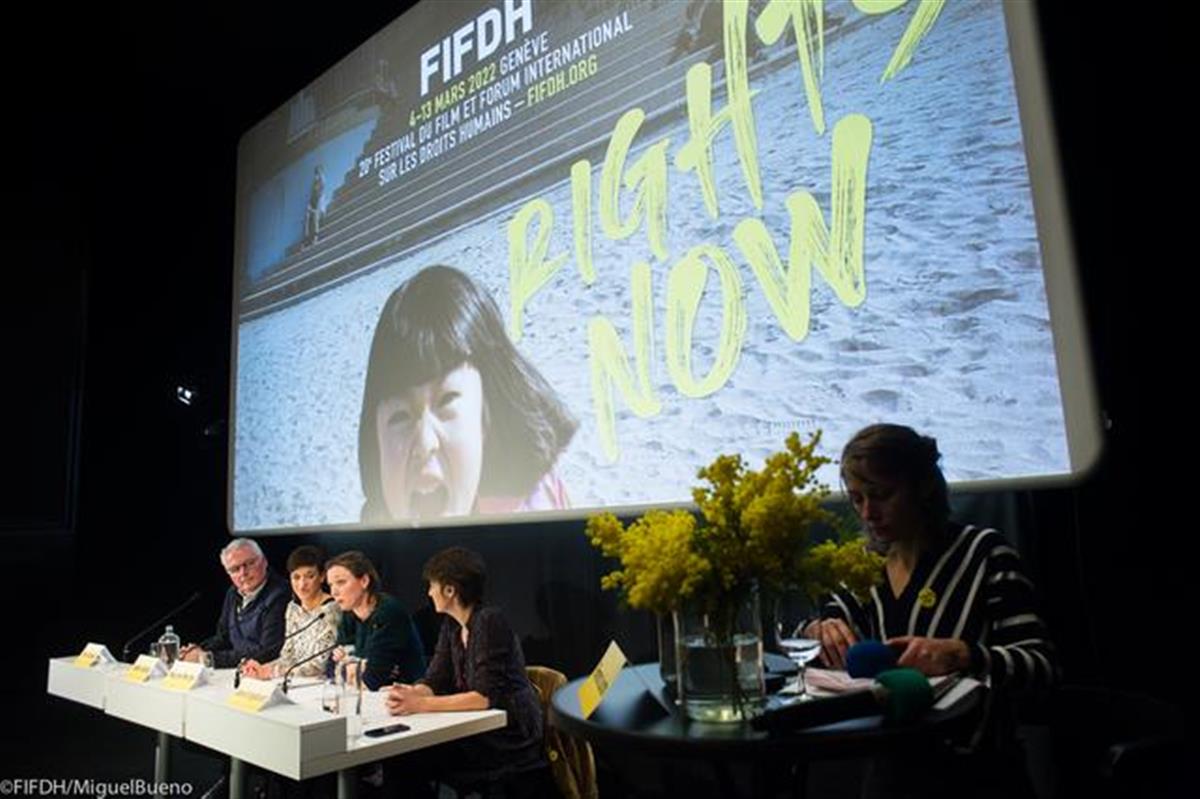
Peace & Humanitarian | #Human rights | News
by Kasmira Jefford
When Covid struck in early 2020, Geneva’s International Film Festival and Forum on Human Rights (FIFDH) was one of the first major cultural events forced to cancel its plans.
FIFDH’s organisers had to think fast about how to shift its public screenings to the digital sphere – no small feat for a festival that usually attracts around 40,000 people and speakers – and within 48 hours, an online programme was announced.
Two years and three editions later, FIFDH is making a comeback to cinemas and other venues across Geneva, from 4-13 March after unveiling its programme of film screenings, interviews and debates on Tuesday.
Isabelle Gattiker, FIFDH’s outgoing artistic director, said emotions were running high in the run-up to this edition, which will also mark 20 years since the film festival, held in parallel to the main session of the UN Human Rights Council in Geneva, was first launched.
“It’s a joy and also a relief because it was not easy to plan this edition. There was a lot of uncertainty,” she told journalists.
“It has really been an emotional time. The aim of the festival is to be able to meet in person, so, the last few years have been very difficult for the team,” said Bruno Giussani, president of the FIFDH Foundation, and European director of Ted conferences. Being able now to return to the screens represented a significant moment, he added.
Covid-19 cases in Switzerland have been steadily dropping and on Wednesday the government is expected to announce a further relaxation of measures.
If all continues as planned, FIFDH will screen 36 films and documentaries and hold 20 debates as well as eight major interviews, 10 exhibitions, partner events, and a concert with singer Dame Barbara Hendricks, the festival’s patron, and UNHCR goodwill ambassador, over the course of the ten days.
Giussani said the festival was taking place in “an era of rupture” and against a backdrop of increasingly dysfunctional global governance structures.
“It has never been so important to talk about and engage in human rights as it is in this fragile context that we live today,” he said. Through film, facts, and story-telling, “we describe the real state of the world,” he said.
This year’s festival will give the floor to women worldwide “who have stood up for their convictions” said Gattiker. Among them, the Vietnamese journalist and activist Pham Doan Trang, imprisoned for several months in her country, and Trinidad and Tobago activist Ida Leblanc, who has campaigned to protect workers’ rights. The festival has been dedicated in their honour.
Other guests include American whistleblower Chelsea Manning, who will speak about the human rights effects linked to digital data. US abortion rights activist Paxton Smith, World Trade Organization (WTO) director general Ngozi Okonjo-Iweala and Iranian political activist and Nobel Peace Prize winner Shirin Ebadi.
Several films and debates will tackle the problematic issues of peace and reconciliation such as in Algeria with writer Alice Zeniter and the historian Benjamin Stora – with next month also marking 60 years since the Evian Accords that paved the way for Algeria’s independence.
Also on the topic of peacebuilding, Giovanni Buccomino's film After a Revolution, shot in Libya and during the peace negotiations in Geneva and Montreux, looks back at the Libyan revolution.
Other themes include systemic racism in Switzerland, explored in the documentary Je Suis Noires (I am black), by Rachel M’Bon et Juliana Fanjul, which tells the story of black women in Switzerland and their quest for identity.
Several films will be premiered for the first time worldwide, including Angels of Sinjar, about the genocide of the Yezidi people and directed by Oscar-nominated filmmaker Hanna Polak.
UN higher commissioner for human rights Michelle Bachelet will speak alongside Hendricks at the festival’s opening evening on 4 March and pay tribute to one of her predecessors –and the FIFDH’s first patron – Sergio Vieira de Mello, who was killed in Baghdad in 2003.
“In 20 years, the festival has come a long way,” said Gattiker, who will step down at the end of the event after eight years at the helm to join the canton of Geneva as general director of culture and sport.
“We now compete with some of the biggest (international film festivals). But what makes us particularly proud is that this festival radiates throughout the world without having lost any of its irreverent, militant, optimistic, and free spirit.”
#Human rights #FIFDH #film
SOURCE: GENEVA SOLUTIONS